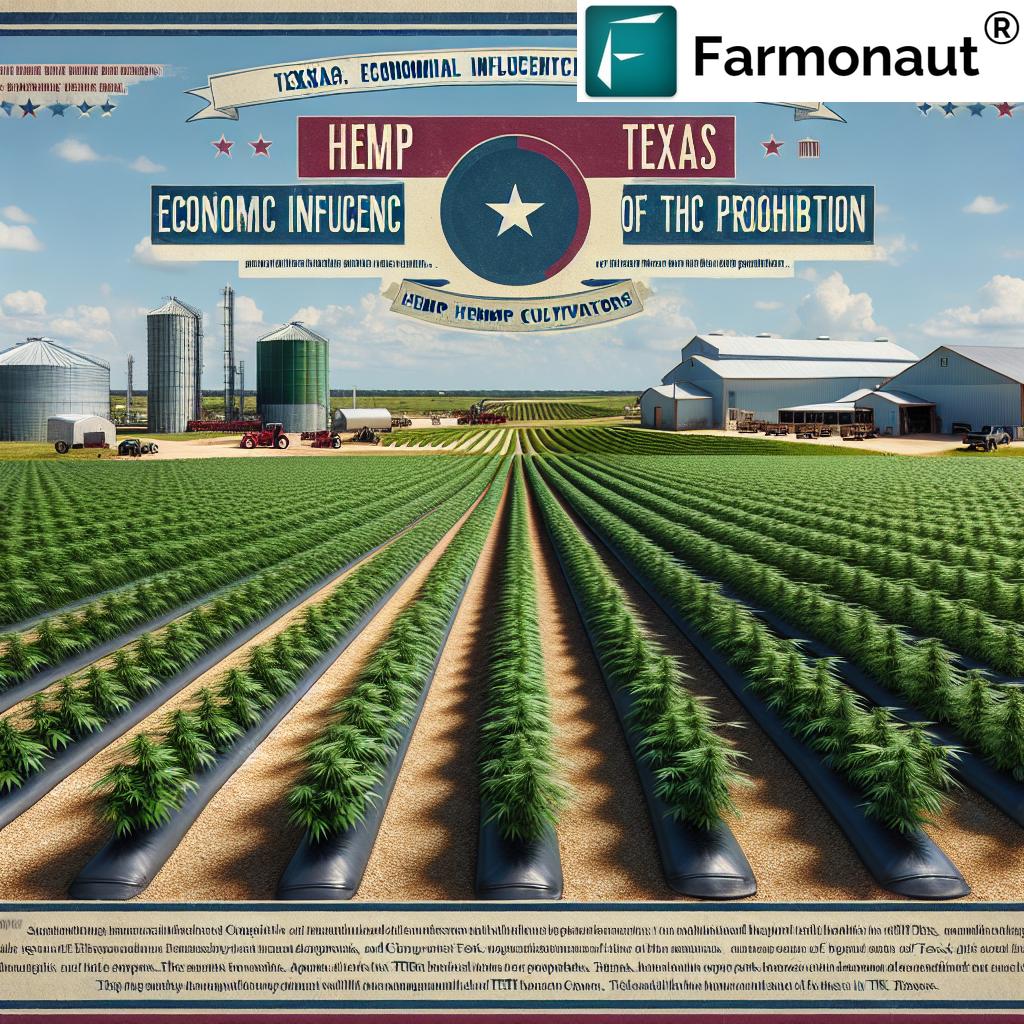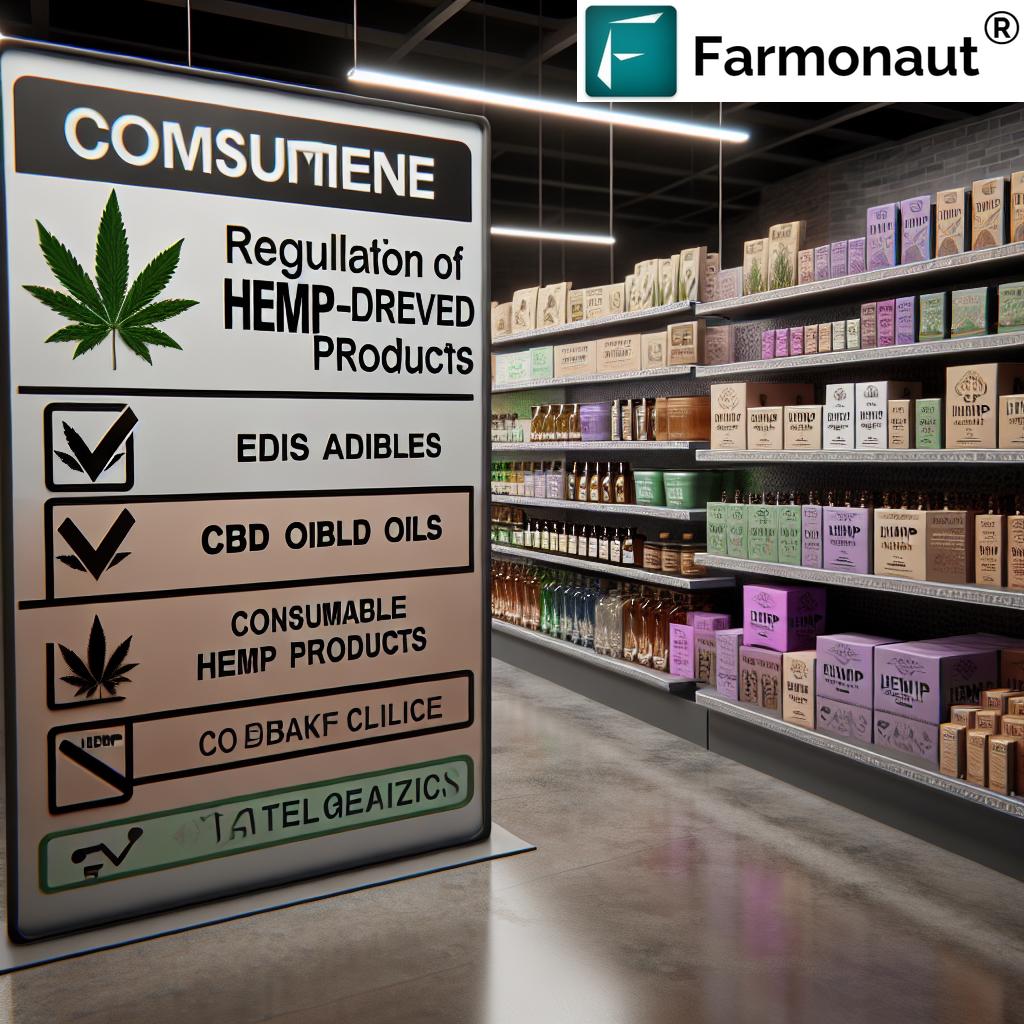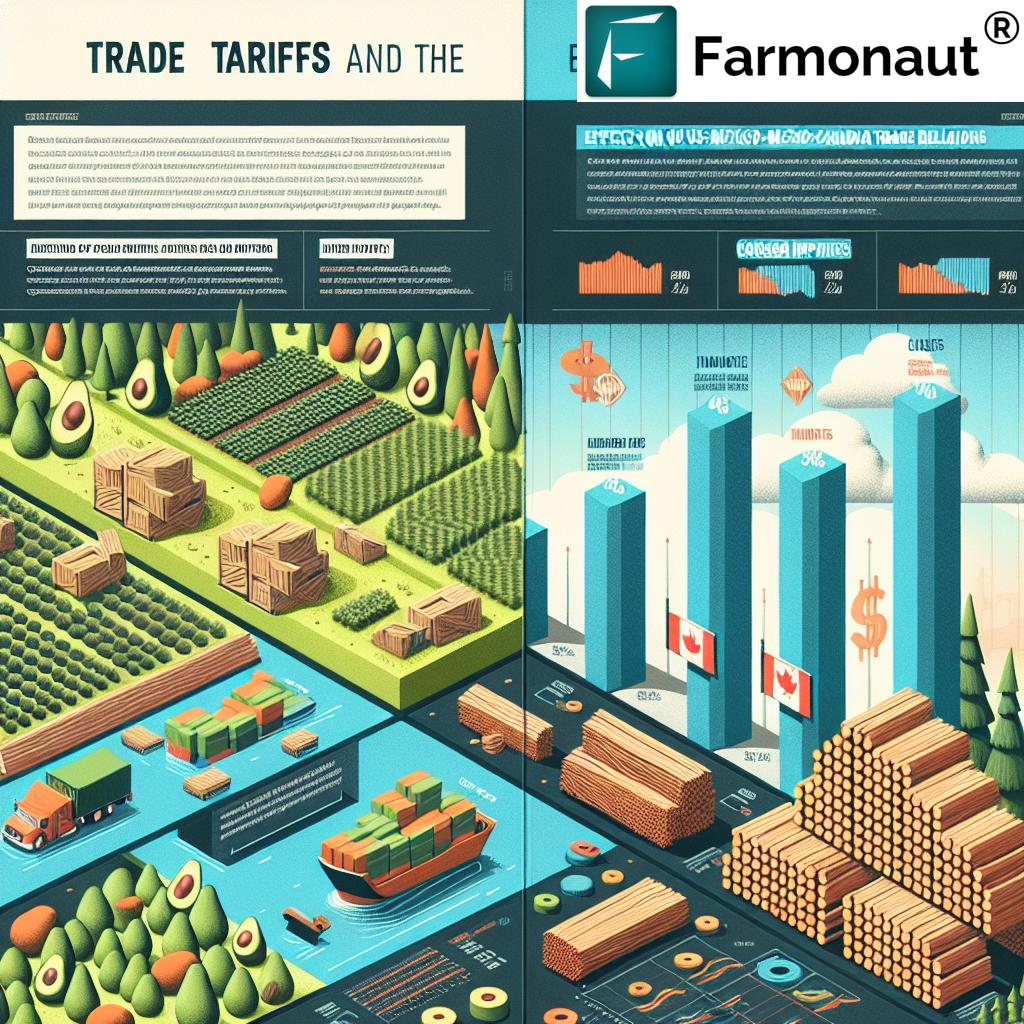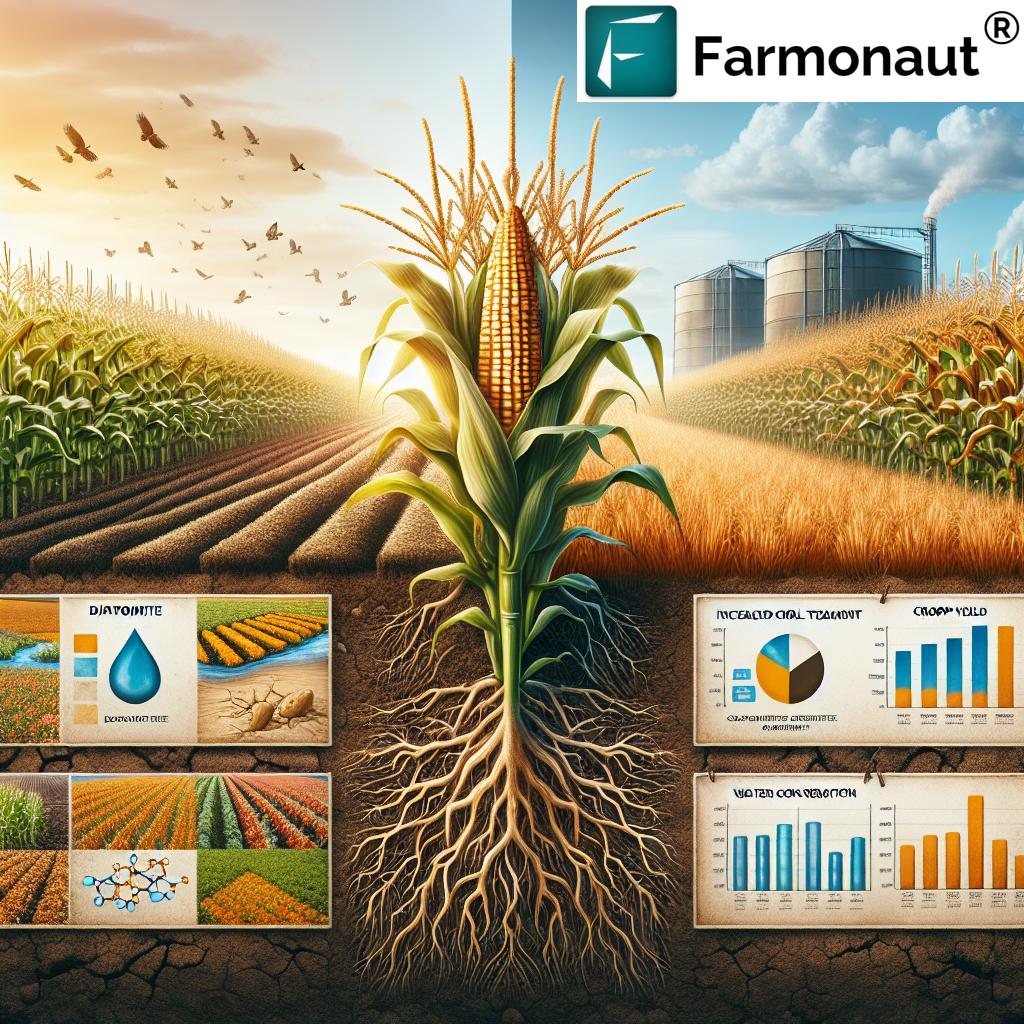Texas Hemp Farmers Fear THC Ban, Industry at Risk
“Over 1,000 Texas hemp businesses could be affected if lawmakers pass a statewide THC ban this year.”
Introduction: THC Ban in Texas—A Growing Concern for the Hemp Industry
The Texas hemp industry is facing a pivotal moment. As lawmakers in Austin consider a sweeping THC ban in Texas under Senate Bill 3 (SB 3), uncertainty and anxiety have gripped the entire sector. Since 2019, when Texas legalized the cultivation and sale of hemp products containing less than 0.3% THC, thousands of farmers, businesses, and entrepreneurs have invested in this rapidly growing field. The recent legislative move to ban all consumable hemp-derived THC products—including popular edibles, beverages, and vapes—has sparked significant concern.
This blog explores the background of the Texas hemp legislation, the details and implications of SB 3, its economic impact, regulatory debates, public safety considerations, and the perspectives of all stakeholders. We also highlight how advanced agritech solutions, like Farmonaut, are supporting farmers in an era of industry trends and uncertainties.
Background: Texas Hemp Industry and Legal Framework
To understand the current debate over the legal status of hemp in Texas, it’s essential to revisit the origins and expansion of the Texas hemp sector. The legalization of hemp in 2019 aligned state law with the federal 2018 Farm Bill. This legislation paved the way for a new market by allowing the cultivation and sale of hemp products containing less than 0.3% THC.
- Before 2019: Cultivation or possession of hemp was strictly prohibited in Texas.
- 2019: The Texas Legislature passed House Bill 1325, legalizing hemp farming and products with a THC content at or below federal standards.
- Post-2019: The sector quickly expanded, led by enterprising farmers and entrepreneurs, and encompassing a wide range of products: from CBD oils, hemp-infused edibles, and dietary supplements to beverages, vapes, textiles, and topicals.
- 2022: The Texas hemp industry generated over $8 billion in revenue and employed more than 50,000 individuals across rural and urban communitiessource.
This rapid market growth was powered by innovative farming techniques, new processing facilities, and a surge in consumer demand for hemp products in wellness, nutrition, and recreational spheres. Yet, this expansion has given rise to complex debates around regulatory oversight, product safety, and the potential for misuse—particularly consumable hemp-derived THC products, such as edibles, beverages, and inhalable vapes.
“Texas hemp industry generated $1.9 billion in economic activity in 2022, now threatened by proposed THC regulations.”
Senate Bill 3—Proposed THC Ban and Its Implications
In early 2025, Texas lawmakers introduced Senate Bill 3 (SB 3)—a piece of proposed legislation that seeks to ban all consumable hemp-derived THC products statewide. The bill would outlaw consumable hemp products containing any amount of THC, including edibles, drinks, vapes, gummies, and oils. Bulk hemp and non-consumable fiber/cosmetic products would remain legal but limited in scope.
- Proponents argue that unregulated THC products pose health risks, are sometimes marketed to minors, and require stricter legal controls to protect public health.
- Lt. Gov. Dan Patrick and supporters claim the ban is necessary to prevent youth exposure and curb accidental overconsumption, emphasizing the risks of potent, unregulated edibles.source
- Opponents point to the economic impact of THC ban, warning that this blanket approach would devastate the Texas hemp industry by eliminating legal sales of THC-containing edibles and beverages—some of the most popular and lucrative product categories for farmers and retailers.source
- The Texas Hemp Business Council and other stakeholders emphasize that a comprehensive ban could result in $7.5 billion of economic losses and up to 40,000 jobs eliminated in the state.
The implications of SB 3 reach far beyond public safety, touching on livelihoods, business investments, consumer access, and long-term industrial growth in Texas.
Economic Impact of THC Ban: Texas Hemp Farmers, Jobs & Markets
The proposed ban on consumable hemp products containing THC would reverberate through every level of the state’s hemp ecosystem. Let’s break down the key projected impacts:
How Would the THC Ban Affect Texas Hemp Farmers?
The Texas hemp farming community has heavily invested in cultivation, processing facilities, licensing, advanced irrigation, and hemp genetics. Many farms such as Hill’s Texas Star Hemp Farms have purchased seeds, built facilities, and hired workers based on established state law.
- If SB 3 becomes law, many of these hemp farmers face the existential threat of losing their livelihoods—with minimal prospect of compensation or alternative markets in the short term.
- The potential economic consequences are stark: the Texas Hemp Business Council estimates a job loss of over 40,000 individuals and a market contraction of up to $7.5 billion if SB 3 is enacted.source
- This would mean significant downturns in local communities—especially in rural Texas, where agriculture forms the backbone of the economy.
- The entire supply chain, from seed providers and processors to marketing firms and truckers, could be equally disrupted by the elimination of consumable THC-containing hemp products.
Implications for Retailers and Consumers
Retailers stocking hemp edibles and beverages in Texas stress the growing consumer demand for legal, regulated THC products, and job opportunities they’ve created in both urban and rural areas. The potential elimination of this entire market segment would not only lead to business closures but also reduce consumer access to alternatives they see as preferable to unregulated, illicit substances.
- The proposed ban could result in the sudden shutdown or downsizing of hundreds of Texas hemp retailers.
- Thousands of consumers would be left without access to products they depend on for wellness, pain management, and recreational enjoyment.
Wider Economic Impact: Rural and Urban Communities
Given its economic footprint, the Texas hemp industry is closely tethered to the fortunes of local economies. A THC ban risks downturns in associated sectors—from logistics and packaging to local advertising and construction.
- This is likely to disproportionately impact small-to-medium businesses, rural towns, and regions that have welcomed hemp as a source of diversified economic opportunity and job creation.
Implications Across the Hemp Supply Chain: Cultivation, Processing, Distribution
A ban on THC-containing consumable hemp products would not only impact farmers—but all participants and partners within the hemp value chain:
- Cultivation and Harvesting: Texas hemp farmers would lose their largest market: flower and biomass grown for consumable products. Seedlings, genetics, and growing capacity would be rendered redundant.
- Processing Facilities: Businesses investing in extraction, refinement, and packaging of oils, isolates, and edibles would see sudden drops in demand.
- Distributors and Logistics: Transportation providers and wholesalers, many of whom serve rural areas, would face further pressure, leading to job loss and economic decline.
- Retailers and E-Commerce: Shops and online stores specializing in CBD edibles and beverages in Texas would be forced to clear shelves, resulting in idle infrastructure and layoffs.
- Consumers: Those who rely on regulated, tested hemp products for health and wellness would be cut off, possibly turning to less predictable, unregulated products or the illicit market.
In summary, the proposed ban could disrupt the entire supply chain, creating a cascade of economic and social consequences across the state.
To better understand the wide-ranging consequences, let’s look at a comparative, SEO-optimized table:
Comparative Impact Table: Projected Effects of Proposed THC Ban in Texas Hemp Industry
| Aspect | Current Status (2024-2025) |
Estimated Change if Ban Enacted | Potential Impact (Qualitative/Quantitative) |
|---|---|---|---|
| Hemp Farmer Revenue (in millions USD, estimated) | $1,200M–$1,500M annually | Drop to $200M–$350M (mainly fibers & non-consumables) | ~80% revenue lost, threatening business survival |
| Number of Hemp-Related Jobs (Statewide) | 50,000+ | Loss of 35,000–40,000 jobs | Large-scale unemployment & community downturns |
| Legal Status of Edibles, Beverages, Vapes | Legal with age restrictions; product lab-testing required | Total ban; removal from all stores | Consumer choice cut, illicit markets may increase |
| Market Size (Total, USD, est.) | $8B (2022) | Potential loss of $7.5B sector value | Economic contraction, business closures |
| Reported Public Health Concerns | Cases of accidental/underage consumption; lack of standardization in select products | May reduce regulated access, but illicit/unregulated product use could rise | Mixed: Improved official control, but risk displacement to illegal or unsafe sources |
Public Health and Hemp Regulation: Risks, Minors & Safety
A major argument supporting the THC ban in Texas centers on public health and hemp regulation. Policymakers are particularly concerned about unregulated products reaching minors and causing accidental intoxication.
- Claims by Advocates: Children and teenagers can potentially access colorful THC edibles or potent vapes, prompting fears of increased emergency room visits and misuse.
- Opponents’ Counterpoint: Many stakeholders and industry advocates point out that most Texas hemp retailers already voluntarily enforce age restrictions, require ID verification, and support product safety measures like standardized lab testing and labeling.
- The Risk of Illicit Markets: If regulated options disappear, illicit operators could fill the gap, distributing untested, misleadingly labeled, or more dangerous alternatives without oversight.
What Are the Alternatives to a Ban?
- Stricter Regulation of Hemp-Derived THC: Instead of a blanket ban, stakeholders encourage new measures—including more robust age-restriction enforcement, clear warning labels, and mandatory independent product testing for all consumable hemp derivatives.
- Balanced Legislative Approach: The Texas Hemp Business Council and other advocacy groups argue that such an approach would address safety and public health concerns without dismantling economic opportunities for farmers and entrepreneurs.
- Public Sentiment: Recent surveys indicate that 68% of likely Texas voters support keeping hemp-derived consumable THC products legal, provided there are strict regulations.source
This debate underscores the need for careful regulation, stakeholder engagement, and a science-driven approach.
Political Dynamics and Legislative Debates Over THC Ban in Texas
- The Political Landscape: The THC ban in Texas has become a front-and-center issue in state politics. Lawmakers, advocacy groups, and citizen coalitions are publicly lobbying for or against SB 3.
- Divided Legislature: The Texas House and Senate reflect a wide spectrum of views—some pushing for broad bans in the name of safety, others calling for fine-tuned regulation over prohibition.
- Governor’s Dilemma: Governor Greg Abbott faces significant pressure from both sides. He can veto the bill, sign it into law, or allow it to become law without his signature—a decision being closely monitored by hemp farmers, business owners, and the wider public.
source - Grassroots Action: Industry organizations, like the Texas Hemp Business Council, are coordinating testimonies, petitions, and education drives to inform lawmakers and urge a reconsideration of the SB 3 approach.
Local, Statewide, and National Implications
What happens in Texas could set a national precedent for other states considering changes to hemp policy. The industry trends and news surrounding SB 3 are closely watched from coast to coast, as Texas is one of the largest hemp markets in the country.
Farmonaut: Advancing Precision Agriculture Amidst Texas Hemp Uncertainty
Even as the Texas hemp industry navigates regulatory challenges, precision agriculture tools are providing a lifeline for farmers adjusting to legislative risks.
At Farmonaut, our mission is to empower farmers worldwide—including those cultivating hemp in Texas—by offering affordable, data-driven solutions via satellite, AI, and traceability technologies. Our real-time crop health monitoring platform (available by web, Android, and iOS apps) delivers practical insights into soil moisture, vegetation health (NDVI), and resource utilization. Our AI-based advisory system provides recommendations that help maximize crop yield and minimize inputs—even in uncertain market conditions.
- Satellite-Based Crop Insights: Monitor your fields, optimize water and fertilizer, and detect stress or pests early—saving time and money no matter what the legal market brings.
- Blockchain Traceability: Boost transparency and consumer trust in compliant hemp products with blockchain-based traceability.
- Resource Management: Manage assets and fleets using our Fleet Management tools—streamlining logistics for hemp or any other crop supply chain.
- Carbon Footprinting: Track and reduce on-farm emissions with Farmonaut’s Carbon Footprinting module.
- Financial Access: Secure better financing with satellite–based crop loan verification.
- API Integrations: Access our satellite and weather data directly via Farmonaut API for agritech projects or research purposes and developer docs.
- Farm Management for All Scales: Whether it’s a small farm or a statewide agribusiness, our platform is built to scale.
The changing regulatory environment highlights the urgency for farmers and businesses in Texas to leverage technology—not just for competitive advantage but as a buffer against regulatory risks impacting cultivation and market access.
FAQ — Texas Hemp Industry, Regulation & Future Outlook
What is SB 3 and what does it ban?
Senate Bill 3 is proposed Texas legislation aiming to ban all consumable hemp-derived THC products, including popular edibles, beverages, vapes, oils, and tinctures containing THC—even if under the 0.3% federal limit.
How much revenue does the Texas hemp industry generate?
The Texas hemp industry generated around $8 billion in total market size in 2022, with $1.9 billion directly linked to business activity from consumable hemp products such as edibles, beverages, and extracts.
Who supports and opposes a THC ban in Texas?
Supporters include some state lawmakers, law enforcement associations, and groups concerned about youth safety, who want to limit access to THC-containing edibles and vapes. Opponents include a majority of hemp farmers, industry associations, retailers, and a significant portion of consumers, all citing job and revenue loss.
What is the current legal status of hemp in Texas?
Hemp is legal to cultivate, process, and sell in Texas as long as THC content remains below 0.3% by dry weight. Hundreds of consumable hemp products—if compliant with state regulation—are currently lawful in stores.
What are possible alternatives to an outright ban?
Alternatives include tighter age restrictions, mandatory product testing, robust labeling, and greater penalties for failure to comply. Most experts and stakeholders advocate improved regulation of hemp-derived THC rather than a total ban—a position supported by recent public sentiment surveys.
How can Farmonaut help support Texas hemp farmers facing legal changes?
We offer precision farm management tools—real-time crop monitoring, yield optimization, and blockchain traceability—to help farmers reduce risk, optimize inputs, and prove compliance or sustainability, regardless of market shifts or regulatory outcomes.
Conclusion: A Call for Balanced Regulation in the Texas Hemp Sector
The unfolding debate over the proposed THC ban in Texas is a defining moment for the Texas hemp industry. It highlights the need for a careful balance between public health concerns, market access, and economic stability for rural and urban stakeholders alike. While the intent to protect minors and ensure product safety is clear, the potential for economic disruption, job losses, and unintended consequences from an outright ban is profound.
Policymakers, farmers, retailers, and consumers must continue to seek common ground—with input from leading-edge technology providers like Farmonaut—to ensure the Texas hemp legislation evolves in a way that safeguards communities while allowing honest business and innovative agriculture to thrive.
For hemp farmers—in Texas and beyond—now is the time to embrace technology, optimize resource management, and diversify operations with cutting-edge tools that support sustainability, traceability, and business resilience. Stay informed, be proactive, and join the discussion around the future of hemp in Texas.















